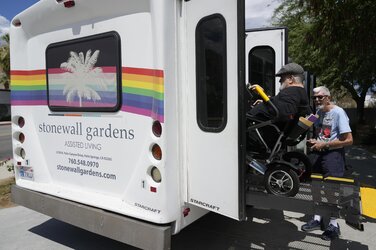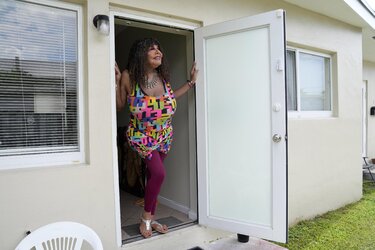Transgender adults are worried about finding welcoming spaces to live in their later years
Associated Press (archive.ph)
By Andrew Demillo, Lynne Sladky, and Laura Bargfeld
2023-08-24 12:02:02GMT

Andrea Montanez sits in her office in the Hope Community Center, Thursday, June 22, 2023, in Apopka, Fla. Florida's law has already created obstacles for Montanez, an LGBTQ+ immigration organizer. Montanez, 57, said her prescription for hormone therapy was initially denied after the restrictions were signed. (AP Photo/John Raoux)
FORT LAUDERDALE, Fla. (AP) — Rajee Narinesingh faced struggles throughout her life as a transgender woman, from workplace discrimination to the lasting effects of black market injections that scarred her face and caused chronic infections.
In spite of the roadblocks, the 56-year-old Florida actress and activist has seen growing acceptance since she first came out decades ago.

Rajee Narinesingh speaks about her life during an interview at her home, Thursday, June 29, 2023, in Fort Lauderdale, Fla. Narinesingh, 56, faced struggles throughout her life as a transgender woman, from trying to get government documents like passports to the lasting effects of black market silicone injections that scarred her face. (AP Photo/Lynne Sladky)
“If you see older transgender people, it shows the younger community that it’s possible I can have a life. I can live to an older age,” she said. “So I think that’s a very important thing.”
Now, as a wave of new state laws enacted this year limit transgender people’s rights, Narinesingh has new uncertainty about her own future as she ages.
“Every now and then I have like this thought, like, oh my God, if I end up in a nursing home, how are they going to treat me?” Narinesingh said.

Rajee Narinesingh, a transgender woman, holds a photograph of herself as a child, Thursday, June 29, 2023, in Fort Lauderdale, Fla. In spite of several roadblocks, the 56-year-old Florida actress and activist has seen growing acceptance since she first came out decades ago. (AP Photo/Lynne Sladky)
Most of the new state laws have focused attention on trans youth, with at least 22 states banning or restricting gender-affirming care for minors.
For many transgender seniors, it’s brought new fears to their plans for retirement and old age. They already face gaps in health care and nursing home facilities properly trained to meet their needs. That’s likely to be compounded by restrictions to transgender health care that have already blocked some adults’ access to treatments in Florida, and sparked concerns the laws will expand to other states.
Transgender adults say they’re worried about finding welcoming spaces to live in their later years.

Morgan Mayfaire, a transgender man, right, walks with his wife, Ashley, Sunday, July 23, 2023, at Fairchild Tropical Garden in Miami. Mayfaire, 64, is the executive director of TransSOCIAL, a Florida support and advocacy group. (AP Photo/Lynne Sladky)
“I have friends that have retired and they’ve decided to move to retirement communities. And then, little by little, they’ve found that they’re not welcome there,” said Morgan Mayfaire, a transgender man and the executive director of TransSOCIAL, a Florida support and advocacy group.
Discrimination can range from being denied housing to being misgendered and struggling to get nursing homes to acknowledge their visitation rights.
“In order to be welcome there, they have to go into the closet and deny who they are,” Mayfaire said.

Morgan Mayfaire, a transgender man, right, holds hands with his wife, Ashley, Sunday, July 23, 2023, at Fairchild Tropical Garden in Miami. Mayfaire, 64, the executive director of TransSOCIAL, a Florida support and advocacy group, says “The community’s going to take care of itself. It’s as simple as that. We’re going to find ways to take care of ourselves and we’re going to survive this. ... And as far as trans youth panicking over this, look to your elders.”. (AP Photo/Lynne Sladky)
About 171,000 of the more than 1.3 million transgender adults in the United States are aged 65 and older, according to numbers compiled by the Williams Institute at the UCLA School of Law.
The growing population has brought more services such as nursing homes and assisted living centers that are geared toward serving the LGBTQ+ community, though such facilities remain uncommon. They include Stonewall Gardens, a 24-apartment assisted living center that opened in Palm Springs, California in 2015.
The center’s staff are required to go through sensitivity training to help make the center a more welcoming environment for residents, interim executive director Lauren Kabakoff Vincent said. The training is key for making a more accepting environment for transgender residents and making them feel more at home.
“Do you really want to be moving into a place where you have to explain yourself and have to go through it over and over?” Vincent said. “It’s exhausting, and so I think being able to be in a comfortable environment is important.”

Stonewall Gardens employee Brian Trout, second from left, leads a game of Bingo with residents of the LGBTQ+ assisted living facility, Tuesday, Aug. 15, 2023, in Palm Springs, Calif. (AP Photo/Marcio Jose Sanchez)

Resident Alex Smariga walks past a pride flag while returning from a physical therapy session at Stonewall Gardens, a LGBTQ+ assisted living facility, Tuesday, Aug. 15, 2023, in Palm Springs, Calif. The number of services such as nursing homes and assisted living centers that are geared toward serving the LGBTQ+ community is increasing, though such facilities remain uncommon. (AP Photo/Marcio Jose Sanchez)

Resident Billy Church, in wheelchair, is helped into a van headed for a group lunch at Stonewall Gardens, a LGBTQ+ assisted living facility, Tuesday, Aug. 15, 2023, in Palm Springs, Calif. About 171,000 of the more than 1.3 million transgender adults in the United States are aged 65 and older, according to numbers compiled by the Williams Institute at the UCLA School of Law. (AP Photo/Marcio Jose Sanchez)
SAGE, which advocates on behalf of LGBTQ+ seniors, offers training to nursing homes and other elder care providers. The group trained more than 46,000 staff at 576 organizations around the country in the most recent fiscal year. But the group acknowledges that represents just a fraction of the elder care facilities around the country.
“We have a long way to go in terms of getting to the point where nursing homes, assisted living and other long-term care providers are prepared for and ready to provide appropriate and welcoming care to trans elders,” said Michael Adams, SAGE’s CEO.
The gap concerns Tiffany Arieagus, 71, an acclaimed drag performer in south Florida who also works in social services for SunServe, an LGBTQ+ nonprofit.
“I just am going on my 71 years on this earth and walking in the civil rights march with my mother at age six and then marching for gay rights,” Arieagus said. “I’ve been blessed enough to see so many changes being made in the world. And then now I’m having to see these wonderful progressions going backwards.”
A handful of states, including Massachusetts and California, have in recent years enacted laws to ensure that LGBTQ+ seniors have equal access to programs for aging populations and requiring training on how to serve that community.
But the push for restrictions on access to health care has brought uncertainty in other states. Florida’s ban on gender-affirming care for minors also includes restrictions that make it difficult, if not impossible, for many adults to get treatment.
SAGE has seen a spike in the number of calls to its hotline following the wave of anti-transgender laws, and Adams said about 40% of them have come from trans seniors primarily in conservative parts of the country worried about the new restrictions.
The limits have prompted some trans adults to leave the state for care, with some turning to crowdfunding appeals for help. But for many trans seniors, such a move isn’t as easy.
“You have the general fear, fear that is leading clinicians being concerned and perhaps stepping away from offering care, fear of trans elders of who is a safe clinician to go to,” Dan Stewart, associate director of the Human Rights Campaign’s Aging Equality Project, said.
Florida’s law has already created obstacles for Andrea Montanez, LGBTQ immigration organizer at Hope CommUnity Center near Orlando. Montanez, 57, said her prescription for hormone therapy was initially denied after the restrictions were signed.
Montanez, who has been speaking out at Florida Medical Board meetings about the impact of the new state law, said she’s worried about what it will be mean as she approaches retirement.
“I hope I have a happy retirement, but health care is a big problem,” Montanez, who was eventually able to get her prescription filled, said.
For Tatiana Williams, 51, the restrictions are stirring painful memories of a time when she and other members of the transgender community had to rely on dangerous and illegal sources for gender-affirming medical care. Now the the executive director of the Transinclusive Group in Wilton Manors, Florida, Williams remembers being hospitalized for a collapsed lung after receiving black market silicone injections for her breasts.
“What we don’t want is the community resorting to going back to that,” Williams said.

Tatiana Williams, 51, executive director of the Transinculsive Group, sits for a portrait in her office, Thursday, June 1, 2023, in Wilton Manors, Fla. Williams, 51, has painful memories of a time when she and other members of the transgender community had to rely on dangerous and illegal sources for gender-affirming medical care. “What we don't want is the community resorting to going back to that,” Williams says. (AP Photo/Lynne Sladky)
Still, older transgender adults say they see hope in how their generation is working with younger trans people to speak out against the wave of the restrictions.
“The community’s going to take care of itself. It’s as simple as that. We’re going to find ways to take care of ourselves and we’re going to survive this,” Mayfaire said. “And as far as trans youth panicking over this, look to your elders.”

A placard supporting transgender rights is shown at the Stonewall Pride Parade and Street Festival, Saturday, June 17, 2023, in Wilton Manors, Fla. (AP Photo/Lynne Sladky)

Tiffany Arieagus, a transgender woman, second from left, rides on a float during the Stonewall Pride Parade and Street Festival, Saturday, June 17, 2023, in Wilton Manors, Fla. Arieagus, 71, is an acclaimed drag performer in south Florida also works in social services for SunServe, an LGBTQ+ nonprofit. (AP Photo/Lynne Sladky)

Andrea Montanez sits in her office in the Hope Community Center, Thursday, June 22, 2023, in Apopka, Fla. Florida's law has already created obstacles for Montanez, an LGBTQ+ immigration organizer. Montanez, 57, said her prescription for hormone therapy was initially denied after the restrictions were signed. “I hope I have a happy retirement, but health care is a big problem," Montanez says. (AP Photo/John Raoux)

Morgan Mayfaire, a transgender man, second from left, hosts a community gathering for a food distribution event at TransSOCIAL, Thursday, July 27, 2023, in Miami. “I have friends that have retired and they’ve decided to move to retirement communities. And then, little by little, they’ve found that they’re not welcome there,” says Mayfaire. (AP Photo/Lynne Sladky)

Stonewall Gardens employee Brian Trout, second from left, leads a game of Bingo with residents of the LGBTQ+ assisted living facility, Tuesday, Aug. 15, 2023, in Palm Springs, Calif. (AP Photo/Marcio Jose Sanchez)

John Schmidt, center, joins fellow residents in a game of Bingo at Stonewall Gardens, a LGBTQ+ assisted living facility, Tuesday, Aug. 15, 2023, in Palm Springs, Calif. The number of services such as nursing homes and assisted living centers that are geared toward serving the LGBTQ+ community is increasing, though such facilities remain uncommon. (AP Photo/Marcio Jose Sanchez)

Robert Lopez, right, a driver for Stonewall Gardens, opens a door for resident Alex Smariga at the LGBTQ+ assisted living facility, Tuesday, Aug. 15, 2023, in Palm Springs, Calif. About 171,000 of the more than 1.3 million transgender adults in the United States are aged 65 and older, according to numbers compiled by the Williams Institute at the UCLA School of Law. (AP Photo/Marcio Jose Sanchez)

Rajee Narinesingh, a transgender woman, looks out from a doorway of her home, Thursday, June 29, 2023, in Fort Lauderdale, Fla. “If you see older transgender people, it shows the younger community that it’s possible I can have a life. I can live to an older age,” she says. “So I think that’s a very important thing.” (AP Photo/Lynne Sladky)

Rajee Narinesingh, a transgender woman, wipes away a tear as she speaks about her life during an interview at her home, Thursday, June 29, 2023, in Fort Lauderdale, Fla. “Every now and then I have like this thought, like, oh my God, if I end up in a nursing home, how are they going to treat me?” Narinesingh says. (AP Photo/Lynne Sladky)
Associated Press (archive.ph)
By Andrew Demillo, Lynne Sladky, and Laura Bargfeld
2023-08-24 12:02:02GMT

Andrea Montanez sits in her office in the Hope Community Center, Thursday, June 22, 2023, in Apopka, Fla. Florida's law has already created obstacles for Montanez, an LGBTQ+ immigration organizer. Montanez, 57, said her prescription for hormone therapy was initially denied after the restrictions were signed. (AP Photo/John Raoux)
FORT LAUDERDALE, Fla. (AP) — Rajee Narinesingh faced struggles throughout her life as a transgender woman, from workplace discrimination to the lasting effects of black market injections that scarred her face and caused chronic infections.
In spite of the roadblocks, the 56-year-old Florida actress and activist has seen growing acceptance since she first came out decades ago.

Rajee Narinesingh speaks about her life during an interview at her home, Thursday, June 29, 2023, in Fort Lauderdale, Fla. Narinesingh, 56, faced struggles throughout her life as a transgender woman, from trying to get government documents like passports to the lasting effects of black market silicone injections that scarred her face. (AP Photo/Lynne Sladky)
“If you see older transgender people, it shows the younger community that it’s possible I can have a life. I can live to an older age,” she said. “So I think that’s a very important thing.”
Now, as a wave of new state laws enacted this year limit transgender people’s rights, Narinesingh has new uncertainty about her own future as she ages.
“Every now and then I have like this thought, like, oh my God, if I end up in a nursing home, how are they going to treat me?” Narinesingh said.

Rajee Narinesingh, a transgender woman, holds a photograph of herself as a child, Thursday, June 29, 2023, in Fort Lauderdale, Fla. In spite of several roadblocks, the 56-year-old Florida actress and activist has seen growing acceptance since she first came out decades ago. (AP Photo/Lynne Sladky)
Most of the new state laws have focused attention on trans youth, with at least 22 states banning or restricting gender-affirming care for minors.
For many transgender seniors, it’s brought new fears to their plans for retirement and old age. They already face gaps in health care and nursing home facilities properly trained to meet their needs. That’s likely to be compounded by restrictions to transgender health care that have already blocked some adults’ access to treatments in Florida, and sparked concerns the laws will expand to other states.
Transgender adults say they’re worried about finding welcoming spaces to live in their later years.

Morgan Mayfaire, a transgender man, right, walks with his wife, Ashley, Sunday, July 23, 2023, at Fairchild Tropical Garden in Miami. Mayfaire, 64, is the executive director of TransSOCIAL, a Florida support and advocacy group. (AP Photo/Lynne Sladky)
“I have friends that have retired and they’ve decided to move to retirement communities. And then, little by little, they’ve found that they’re not welcome there,” said Morgan Mayfaire, a transgender man and the executive director of TransSOCIAL, a Florida support and advocacy group.
Discrimination can range from being denied housing to being misgendered and struggling to get nursing homes to acknowledge their visitation rights.
“In order to be welcome there, they have to go into the closet and deny who they are,” Mayfaire said.

Morgan Mayfaire, a transgender man, right, holds hands with his wife, Ashley, Sunday, July 23, 2023, at Fairchild Tropical Garden in Miami. Mayfaire, 64, the executive director of TransSOCIAL, a Florida support and advocacy group, says “The community’s going to take care of itself. It’s as simple as that. We’re going to find ways to take care of ourselves and we’re going to survive this. ... And as far as trans youth panicking over this, look to your elders.”. (AP Photo/Lynne Sladky)
About 171,000 of the more than 1.3 million transgender adults in the United States are aged 65 and older, according to numbers compiled by the Williams Institute at the UCLA School of Law.
The growing population has brought more services such as nursing homes and assisted living centers that are geared toward serving the LGBTQ+ community, though such facilities remain uncommon. They include Stonewall Gardens, a 24-apartment assisted living center that opened in Palm Springs, California in 2015.
The center’s staff are required to go through sensitivity training to help make the center a more welcoming environment for residents, interim executive director Lauren Kabakoff Vincent said. The training is key for making a more accepting environment for transgender residents and making them feel more at home.
“Do you really want to be moving into a place where you have to explain yourself and have to go through it over and over?” Vincent said. “It’s exhausting, and so I think being able to be in a comfortable environment is important.”

Stonewall Gardens employee Brian Trout, second from left, leads a game of Bingo with residents of the LGBTQ+ assisted living facility, Tuesday, Aug. 15, 2023, in Palm Springs, Calif. (AP Photo/Marcio Jose Sanchez)

Resident Alex Smariga walks past a pride flag while returning from a physical therapy session at Stonewall Gardens, a LGBTQ+ assisted living facility, Tuesday, Aug. 15, 2023, in Palm Springs, Calif. The number of services such as nursing homes and assisted living centers that are geared toward serving the LGBTQ+ community is increasing, though such facilities remain uncommon. (AP Photo/Marcio Jose Sanchez)

Resident Billy Church, in wheelchair, is helped into a van headed for a group lunch at Stonewall Gardens, a LGBTQ+ assisted living facility, Tuesday, Aug. 15, 2023, in Palm Springs, Calif. About 171,000 of the more than 1.3 million transgender adults in the United States are aged 65 and older, according to numbers compiled by the Williams Institute at the UCLA School of Law. (AP Photo/Marcio Jose Sanchez)
SAGE, which advocates on behalf of LGBTQ+ seniors, offers training to nursing homes and other elder care providers. The group trained more than 46,000 staff at 576 organizations around the country in the most recent fiscal year. But the group acknowledges that represents just a fraction of the elder care facilities around the country.
“We have a long way to go in terms of getting to the point where nursing homes, assisted living and other long-term care providers are prepared for and ready to provide appropriate and welcoming care to trans elders,” said Michael Adams, SAGE’s CEO.
The gap concerns Tiffany Arieagus, 71, an acclaimed drag performer in south Florida who also works in social services for SunServe, an LGBTQ+ nonprofit.
“I just am going on my 71 years on this earth and walking in the civil rights march with my mother at age six and then marching for gay rights,” Arieagus said. “I’ve been blessed enough to see so many changes being made in the world. And then now I’m having to see these wonderful progressions going backwards.”
A handful of states, including Massachusetts and California, have in recent years enacted laws to ensure that LGBTQ+ seniors have equal access to programs for aging populations and requiring training on how to serve that community.
But the push for restrictions on access to health care has brought uncertainty in other states. Florida’s ban on gender-affirming care for minors also includes restrictions that make it difficult, if not impossible, for many adults to get treatment.
SAGE has seen a spike in the number of calls to its hotline following the wave of anti-transgender laws, and Adams said about 40% of them have come from trans seniors primarily in conservative parts of the country worried about the new restrictions.
The limits have prompted some trans adults to leave the state for care, with some turning to crowdfunding appeals for help. But for many trans seniors, such a move isn’t as easy.
“You have the general fear, fear that is leading clinicians being concerned and perhaps stepping away from offering care, fear of trans elders of who is a safe clinician to go to,” Dan Stewart, associate director of the Human Rights Campaign’s Aging Equality Project, said.
Florida’s law has already created obstacles for Andrea Montanez, LGBTQ immigration organizer at Hope CommUnity Center near Orlando. Montanez, 57, said her prescription for hormone therapy was initially denied after the restrictions were signed.
Montanez, who has been speaking out at Florida Medical Board meetings about the impact of the new state law, said she’s worried about what it will be mean as she approaches retirement.
“I hope I have a happy retirement, but health care is a big problem,” Montanez, who was eventually able to get her prescription filled, said.
For Tatiana Williams, 51, the restrictions are stirring painful memories of a time when she and other members of the transgender community had to rely on dangerous and illegal sources for gender-affirming medical care. Now the the executive director of the Transinclusive Group in Wilton Manors, Florida, Williams remembers being hospitalized for a collapsed lung after receiving black market silicone injections for her breasts.
“What we don’t want is the community resorting to going back to that,” Williams said.

Tatiana Williams, 51, executive director of the Transinculsive Group, sits for a portrait in her office, Thursday, June 1, 2023, in Wilton Manors, Fla. Williams, 51, has painful memories of a time when she and other members of the transgender community had to rely on dangerous and illegal sources for gender-affirming medical care. “What we don't want is the community resorting to going back to that,” Williams says. (AP Photo/Lynne Sladky)
Still, older transgender adults say they see hope in how their generation is working with younger trans people to speak out against the wave of the restrictions.
“The community’s going to take care of itself. It’s as simple as that. We’re going to find ways to take care of ourselves and we’re going to survive this,” Mayfaire said. “And as far as trans youth panicking over this, look to your elders.”

A placard supporting transgender rights is shown at the Stonewall Pride Parade and Street Festival, Saturday, June 17, 2023, in Wilton Manors, Fla. (AP Photo/Lynne Sladky)

Tiffany Arieagus, a transgender woman, second from left, rides on a float during the Stonewall Pride Parade and Street Festival, Saturday, June 17, 2023, in Wilton Manors, Fla. Arieagus, 71, is an acclaimed drag performer in south Florida also works in social services for SunServe, an LGBTQ+ nonprofit. (AP Photo/Lynne Sladky)

Andrea Montanez sits in her office in the Hope Community Center, Thursday, June 22, 2023, in Apopka, Fla. Florida's law has already created obstacles for Montanez, an LGBTQ+ immigration organizer. Montanez, 57, said her prescription for hormone therapy was initially denied after the restrictions were signed. “I hope I have a happy retirement, but health care is a big problem," Montanez says. (AP Photo/John Raoux)

Morgan Mayfaire, a transgender man, second from left, hosts a community gathering for a food distribution event at TransSOCIAL, Thursday, July 27, 2023, in Miami. “I have friends that have retired and they’ve decided to move to retirement communities. And then, little by little, they’ve found that they’re not welcome there,” says Mayfaire. (AP Photo/Lynne Sladky)

Stonewall Gardens employee Brian Trout, second from left, leads a game of Bingo with residents of the LGBTQ+ assisted living facility, Tuesday, Aug. 15, 2023, in Palm Springs, Calif. (AP Photo/Marcio Jose Sanchez)

John Schmidt, center, joins fellow residents in a game of Bingo at Stonewall Gardens, a LGBTQ+ assisted living facility, Tuesday, Aug. 15, 2023, in Palm Springs, Calif. The number of services such as nursing homes and assisted living centers that are geared toward serving the LGBTQ+ community is increasing, though such facilities remain uncommon. (AP Photo/Marcio Jose Sanchez)

Robert Lopez, right, a driver for Stonewall Gardens, opens a door for resident Alex Smariga at the LGBTQ+ assisted living facility, Tuesday, Aug. 15, 2023, in Palm Springs, Calif. About 171,000 of the more than 1.3 million transgender adults in the United States are aged 65 and older, according to numbers compiled by the Williams Institute at the UCLA School of Law. (AP Photo/Marcio Jose Sanchez)

Rajee Narinesingh, a transgender woman, looks out from a doorway of her home, Thursday, June 29, 2023, in Fort Lauderdale, Fla. “If you see older transgender people, it shows the younger community that it’s possible I can have a life. I can live to an older age,” she says. “So I think that’s a very important thing.” (AP Photo/Lynne Sladky)

Rajee Narinesingh, a transgender woman, wipes away a tear as she speaks about her life during an interview at her home, Thursday, June 29, 2023, in Fort Lauderdale, Fla. “Every now and then I have like this thought, like, oh my God, if I end up in a nursing home, how are they going to treat me?” Narinesingh says. (AP Photo/Lynne Sladky)
